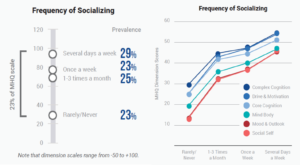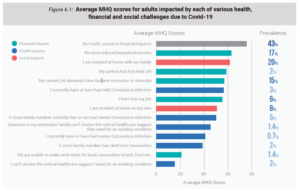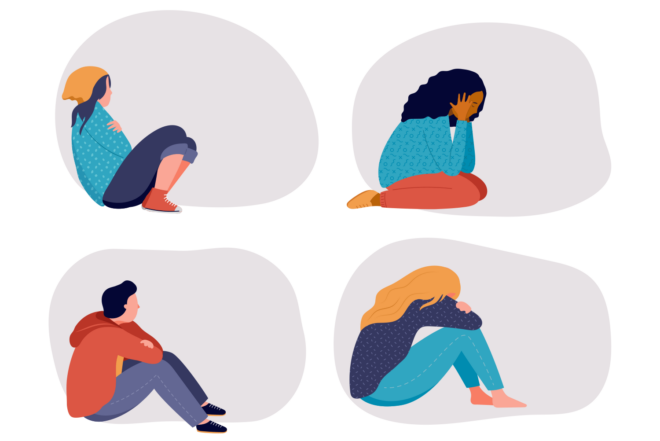The lack of frequent in-person social interaction has serious mental health consequences, probably even more so than physical exercise.
Social connection is a basic human need that we are learning is critical for our health and wellbeing. A wealth of studies illustrate what can happen when people experience social isolation and feelings of loneliness, with the effects ranging from a decline in physical health, to feelings of depression and anxiety [1-4]. Data from the Global Mind project also highlights the importance of social interaction, with people who report frequent face-to-face socializing having strikingly higher mental wellbeing scores compared to those who rarely do so. Across a sample of ~47,000 English-speaking respondents we found that those who typically socialized with friends and family several days a week (based on pre-covid habits) had mental wellbeing scores 66 points higher than those who rarely or never did, while 44% of those who rarely or never socialized had clinical level challenges or risks.

These findings are testament to the critical importance of social interaction to human mental functioning. Yet, we also found that nearly 50% of respondents reported that they either rarely engaged in face-to-face socializing or only socialized 1-3 times a month, basing their answers on pre-covid habits.
Socializing vs sleeping and exercising.
The magnitude of impact of frequent socializing on mental wellbeing is greater than the impact of regular exercise (see related post The Mental Health Profiles of the Sedentary and Sleep Deprived). On the other hand, regularly getting a good night’s sleep (compared to rarely doing do) shows a greater differential in mental wellbeing (82 score points). This suggests that while getting a good night’s sleep still tops the list, regular face-to-face socializing may be more important for mental wellbeing than regular exercising.
Elements of mental wellbeing impacted or driving social behavior
Those who rarely socialized had lower mental wellbeing scores across the board from social self to core cognition, rather than specific to any one dimension of mental wellbeing. However, among individual mental elements, those who rarely socialized face to face were most prominently compromised in their relationships with others, outlook and optimism and self-image and reported challenges with avoidance and withdrawal, guilt and blame; and feelings of sadness, distress or hopelessness. This suggests that challenges with these elements of emotional and social functioning are likely to be both contributors to, and consequences of, lack of face-to-face social interaction.
Social behavior and the Covid-19 pandemic
These landscape of social interaction changed substantially for many with the pandemic and the social distancing measures that were put in place to counteract the spread of the virus (See related post The Mental Cost of the Covid-19 Pandemic). There has been considerable discussion in the scientific community and media about the consequences of these social policies, often in terms of their impact on mental health and wellbeing. In this data we found that having to socially isolate alone took a substantial toll on people’s mental wellbeing, with people reporting, on average, MHQ scores which were 25 points lower than people who had experienced none of the consequences shown in the graph below. Socially isolating with family took a lesser toll but affected a greater number of people (20%).

While risks and anxieties remain, many people may still feel reluctant to return to their pre-pandemic levels of face-to-face socializing even as more people become vaccinated and social policies start to be lifted. Helping people to overcome these fears, when it is safe to do so, will be critical to ensuring that there is not a shift in the population towards less face-to-face socializing, which could have enduring negative consequences for people’s mental wellbeing.
Read our 2020 Mental State of the World report here.
References
[1] Brown, E.G., Gallagher, S., and Creaven, A.M. (2018). Loneliness and acute stress reactivity: A systematic review of psychophysiological studies. Psychophysiology 55(5), e13031. Doi: 10.1111/psyp.13031.
[2] Hawkley, L.C., and Cacioppo, J.T. (2010). Loneliness matters: a theoretical and empirical review of consequences and mechanisms. Annals of behavioral medicine : a publication of the Society of Behavioral Medicine 40(2), 218-227. doi: 10.1007/s12160-010-9210-8.
[3] Lim, M.H., Gleeson, J.F.M., Alvarez-Jimenez, M., and Penn, D.L. (2018). Loneliness in psychosis: a systematic review. Soc Psychiatry Psychiatr Epidemiol 53(3), 221-238. doi: 10.1007/s00127-018-1482-5.
[4] Wang, J., Mann, F., Lloyd-Evans, B., Ma, R., and Johnson, S. (2018). Associations between loneliness and perceived social support and outcomes of mental health problems: a systematic review. BMC Psychiatry 18(1), 156. doi: 10.1186/s12888-018-1736-5.
















